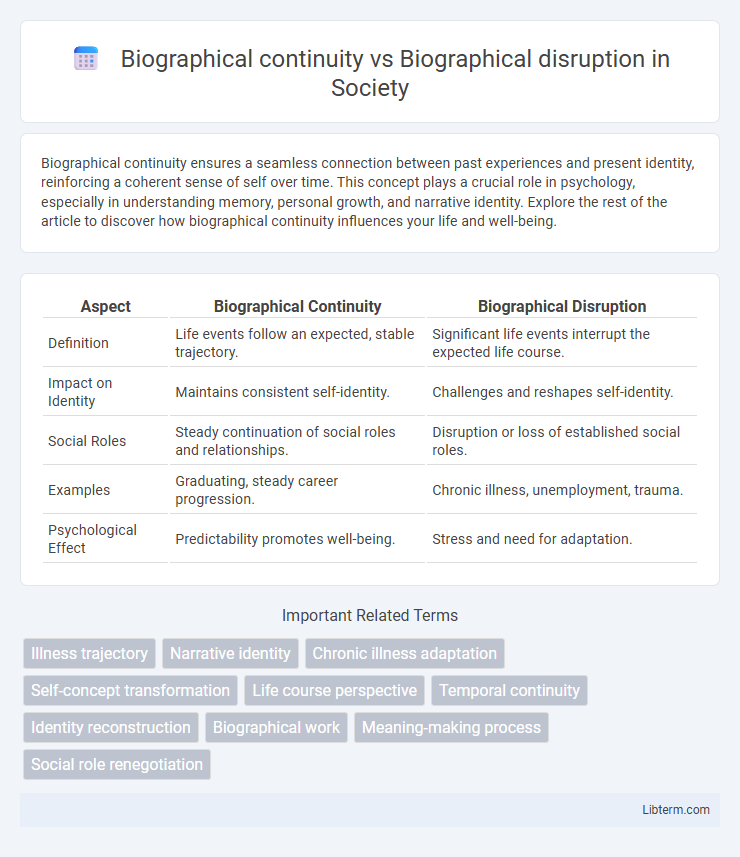Biographical continuity ensures a seamless connection between past experiences and present identity, reinforcing a coherent sense of self over time. This concept plays a crucial role in psychology, especially in understanding memory, personal growth, and narrative identity. Explore the rest of the article to discover how biographical continuity influences your life and well-being.
Table of Comparison
| Aspect | Biographical Continuity | Biographical Disruption |
|---|---|---|
| Definition | Life events follow an expected, stable trajectory. | Significant life events interrupt the expected life course. |
| Impact on Identity | Maintains consistent self-identity. | Challenges and reshapes self-identity. |
| Social Roles | Steady continuation of social roles and relationships. | Disruption or loss of established social roles. |
| Examples | Graduating, steady career progression. | Chronic illness, unemployment, trauma. |
| Psychological Effect | Predictability promotes well-being. | Stress and need for adaptation. |
Understanding Biographical Continuity
Understanding biographical continuity involves the seamless integration of life events into an individual's existing self-narrative, allowing for a stable identity despite changes or challenges. This concept emphasizes how people maintain coherence in their life stories by adapting experiences in a way that supports ongoing personal goals and values. Maintaining biographical continuity is crucial in contexts such as chronic illness or major life transitions, where preserving a consistent sense of self aids psychological resilience and well-being.
Defining Biographical Disruption
Biographical disruption refers to the profound impact chronic illness or major life events have on an individual's expected life narrative, causing a rupture in their self-identity and daily routines. This concept highlights how such disruptions challenge previously held assumptions, forcing individuals to re-evaluate their future plans and social roles. Unlike biographical continuity, which implies a seamless extension of one's life story, biographical disruption emphasizes the need for adaptation and meaning-making in response to unexpected changes.
Historical Context of Biographical Narratives
Biographical continuity emphasizes the preservation of an individual's life story within a stable historical context, highlighting consistent personal identity and coherent life progression. In contrast, biographical disruption occurs when significant events, such as illness or social upheaval, interrupt the expected trajectory of a life narrative, challenging existing self-understandings. The historical context shapes how these narratives are constructed and interpreted, reflecting broader societal changes and cultural values over time.
Key Theories in Biographical Research
Biographical continuity emphasizes the seamless integration of an individual's past experiences with their present identity, highlighting stability in life narratives as outlined by Goffman's dramaturgical theory. In contrast, biographical disruption, extensively theorized by Bury in chronic illness research, focuses on how significant life events interrupt and reshape one's self-concept and social roles. These key theories guide biographical research by analyzing how individuals reconstruct meaning and identity through narrative frameworks in response to continuity or rupture.
Factors Influencing Continuity in Life Stories
Factors influencing biographical continuity in life stories include stable social roles, consistent identity narratives, and supportive social networks that reinforce a coherent self-concept over time. Long-term employment, ongoing relationships, and cultural or community engagement contribute significantly to maintaining personal continuity despite life changes. Psychological resilience and adaptive coping strategies also play crucial roles in preserving a unified life story amidst challenges that might otherwise cause biographical disruption.
Triggers and Sources of Biographical Disruption
Biographical disruption occurs when unexpected life events, such as chronic illness or trauma, interrupt an individual's established self-narrative and daily routines. Triggers include sudden health diagnoses, accidents, or significant social changes that challenge personal identity and future expectations. Sources of biographical disruption often stem from physical limitations, social stigma, and psychological distress that require individuals to reconstruct their life stories and cope with altered realities.
The Role of Identity in Life Course Changes
Biographical continuity emphasizes the persistence of a stable identity throughout life course changes, allowing individuals to integrate new experiences without compromising their self-concept. Biographical disruption occurs when life events challenge or fragment personal identity, requiring significant adjustments in self-perception and social roles. The role of identity in these processes is critical, as a coherent sense of self fosters resilience and meaning-making during transitions such as illness, career shifts, or aging.
Coping Mechanisms and Adaptation Strategies
Biographical continuity involves individuals using established coping mechanisms and adaptation strategies to maintain a consistent self-narrative despite life changes, often relying on familiar routines and social roles. Biographical disruption, however, challenges an individual's identity and requires the development of new coping methods and flexible adaptation strategies to integrate significant life events, such as chronic illness, into their life story. Effective adaptation strategies in both contexts include cognitive reframing, seeking social support, and engaging in problem-solving to restore or reconstruct a coherent sense of self.
Implications for Health and Social Care
Biographical continuity supports the maintenance of a person's identity and routine despite illness, promoting psychological resilience and improved health outcomes in long-term care. Biographical disruption occurs when chronic illness or disability interrupts established life narratives, leading to identity loss and increased dependency on health and social care services. Health professionals must recognize these dynamics to provide tailored support that fosters continuity or addresses disruption, enhancing overall well-being and care effectiveness.
Future Directions in Biographical Studies
Future directions in biographical studies emphasize integrating biographical continuity and disruption to better understand identity formation over time. Researchers are increasingly leveraging longitudinal data and digital narratives to analyze how individuals negotiate life events while maintaining or redefining their self-concept. Advances in interdisciplinary methods and technologies promise deeper insights into the dynamic interplay between stability and change in personal biographies.
Biographical continuity Infographic

 libterm.com
libterm.com